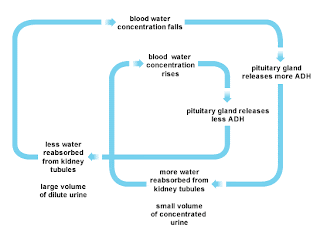There are five major classes of white blood cells that circulate in health individuals: neutrophils are the most numerous, followed by lymphocytes, monocytes, eosinophils, and basophils. Eosinophils are fairly rare, but you can usually find one if you're patient. Basophils, on the other hand, are much rarer, and the pathologist teaching our lab told us not to even bother looking for one because we probably won't find one. This line is not unfamiliar, and I have spent wasted enough time looking for basophils (by "enough time" I mean probably 10 minutes out of the entire 45 minutes of my life that I have probably spent looking at blood smears) that the thrill of the hunt is completely stale. Other people have seen them, I believe in their existence, and that's good enough for me. To thrive survive in the world of science takes a little faith, sometimes.
And sometimes, science rewards that faith. Like on Tuesday, when I, Jane Herriot, was blessed with the presence, in high-power field number eleventy-something, of what was confirmed to be, really and truly, an equine basophil. I was driving the microscope and my friend C— was sitting across from me looking at the slide through the second set of eye pieces (double-headed scopes rock!) and tallying cells. We were about half way through the differential white cell count. We finished counting the field we were viewing and I moved methodically to the next one. My eyes were met with this:
(from: http://sites.google.com/site/scienceprofonline/PBBasophil.jpg)
C— and I looked at each other, the look that says, Are you seeing what I'm seeing? We called the professor over, and she confirmed our find! It was a great day for science.
The real career-affirming moment came today, though. We were sitting in the computer lab working through guided coagulation case studies, when the person sitting across from me mentioned having seen a basophil in hematology lab. "I saw one, too," I said. Person-sitting-across-from-me's lab partner looked at me in awe and said, "Can I touch your hand?!?"
You know medicine is for you when your classmates think you're a hero for finding a basophil on a blood smear.




